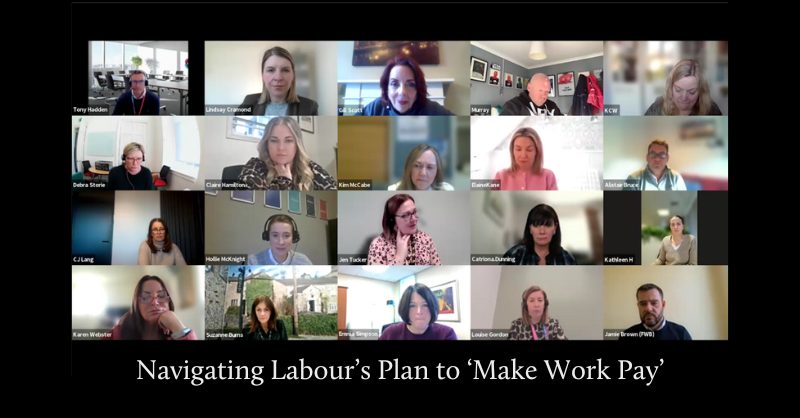Contact the team at FWB to discuss your individual or company requirements, or to discover more about our specialist services.
CEO Forum, Aberdeen – Covid-19 | Wednesday 8th April
16 April 2020
- Thought Leadership
FWB PB Aberdeen office hosted two leadership group discussions concurrently via Zoom, bringing together two cross-sector groups of 10-12 leaders, representing some of the region’s leading organisations. The purpose was to share experiences and strategies relating to how we are approaching the current business challenges due to coronavirus and the oil price slump. The discussions were held under Chatham House rules and extremely open and valuable discussions ensued covering, amongst others, the following topics:
- Identified short-term business priorities driven by both Covid-19 and the oil price slump
- Effectiveness and adoption of government policy – job retention scheme, access to finance including government loan schemes
- Immediate leadership challenges
- Long term impact of both Covid-19 and current oil price projections
- Potential positive outcomes from current crisis
Discussion Points and Insight:
Business Priorities
- The general consensus amongst participants was that preservation of cash was the over-riding short term priority and that prudence in the face of uncertainty was a sound strategy.
- There were a number of participants whose companies had good backlog and they were torn between taking action to reduce costs now based on the view that the backlog was finite and there was little evidence of new business in the short term, and those that felt that their backlog allowed them to retain resources and wait a while before taking potential action to reduce costs based on how the business conditions develop over the coming weeks.
- The view was expressed that leaders could afford to be decisive at this time as some of the cost reduction measures such as the furlough scheme can be reversed as required.
- It was also highlighted that customer relations must also be a priority to ensure they know that companies are focused on delivery and to ensure that contractual commitments will be maintained. There was a discussion on contractual ‘force majeure’ not addressing pandemics.
- The majority of participants led firms that had private equity funding and the view was that to retain the confidence of the investors it was a better tactic to be pro-active and present an operational and financial plan that demonstrated a willingness to take decisive action in the face of the current uncertainty.
- Most participants had applied some or a combination of the following short-term cost-saving measures:
- 15-20% pay cuts across the organisation
- 4 day weeks
- Furlough of staff
- Deferment of bonus
Effectiveness and adoption of government policy
- The majority of participants had utilised the government job retention scheme and had furloughed a number of staff. The discussion centred around the flexibility within the scheme which is still unclear and also the practise of topping up the remaining 20% salary to furloughed workers. Most participants were not subsidising the scheme beyond the 80% pay level. With regard to when companies would receive the funds from the government, most participants were not forecasting the funds being received until June.
- Those participants with international workforces observed that the equivalent job retention schemes in both the US and Norway appeared to be more flexible than the UK scheme. There was also mention of retention support in the UAE, Singapore and Holland. They also commented that it was a challenge to adapt to the varying country legislations applicable to staff in international locations.
- There was consistent criticism of interactions with banks both on a day to day basis and specifically with regard to the government business loan scheme. The view was that banks were being very inflexible and not representing the message the government were relaying that the banks were in a position to support businesses. It was acknowledged that this may evolve but a level of cynicism exists that the banks will play a positive role in helping businesses navigate the funding challenges facing them in the short term.
- There were some specific comments related to the difficulties experienced when trying, in the current business environment, to re-negotiate bank facilities that were due to expire soon.
- Some participants had also observed a possible reticence from banks to support private equity backed organisations, unless investors also demonstrate their commitment by providing additional investment.
Immediate leadership challenges
- All participants commented that as leaders they had to firstly understand the human element at play within their organisations and society as a whole. Many employees were dealing with concerns for their own health and that of their families and friends and business dynamics must be placed in this context.
- From a leadership perspective, many commented that it was important that they prioritised this human element, with a number citing that they were starting most discussions by enquiring about the health and wellbeing of family members before discussing work topics. In many instances it was acknowledged that a greater insight to personal circumstances was bringing a deeper understanding of the pressures their teams were facing.
- It was commented by several participants that this was their most challenging time as a leader and that a number of them were also balancing work commitments with personal concerns for friends and family.
- All agreed that as leaders the emphasis was on communication both as a means of building trust across their organisations but also ensuring an understanding of the reasoning behind decision-making.
- It was unanimously felt that ‘Keep In Touch’ calls or a plan for continuing professional and social dialogue with furloughed employees was crucial. Although they cannot work due to the legislation they can still contribute culturally and need to be supported in the transition.
- The transition to remote working for most of their functions/teams has been smoother than most of the participants expected and good use of technology has enabled this transition. The barriers to change are incredibly low right now and this should be embraced.
- Staff engagement has become even more important than before due to the remote working environment. Leaders need to be more visible and communicate regularly, openly and transparently with the entire staff. For many organisations this is resulting in more regular team, functional and even Board level communications, both formally as well as informally.
- The wellbeing of staff was also high on the priority list for most participants given the practical challenges of home-working for many employees and the inevitable feeling of insecurity in these difficult times.
Long term impact of both Covid-19 and current oil price projections
- When asked if the participants were taking decisions now with a view to the long term, the unanimous verdict was that the total focus was on the short term.
- It was highlighted that accurate long-term forecasting is a significant challenge right now as the pace of change and customer behaviours is rapid. CFO’s are seeing a wide range of forecasting outcomes which is making it difficult to predict what the impact will be.
- A number of participants commented that it will be important to start thinking about what is beyond Covid-19 and how organisations are going to transition back to normal operations.
Future Positive Outcomes
The positive outcomes that may be expected when we come out of the crisis, either for our own businesses or the economy/world in general include:
- Resilience and resourcefulness is apparent, and the opportunity is to harness this in the future.
- Open and transparent communication from the top and around the business must continue.
- Streamlining of costs – everybody is thinking about how things are done and this should lead to greater efficiency in the future.
- Increased use in technology for the right reasons. The adoption of video-conferencing as a viable communication tool will happen resulting in less travel.
Final thoughts
The participants were positive about the need to galvanise everyone together to get their respective organisations through the current crisis in as good a shape as possible. Most participants were from the oil & gas sector and acknowledged that there are going to be ongoing business challenges beyond the recovery from Covid-19.
The current situation is testing leaders in a way we have never been tested before, and they are required to ‘step up’ as leaders. Whilst everyone understands the pressing business challenges, all agreed that acting with decency and integrity will really count.
This leadership forum will be repeated regularly and we are hosting similar sessions for functional leaders including Finance and HR. For further information about any of these forums please contact Stuart Cochrane (stuart@fwbparkbrown.com) or John Cameron (john@fwbparkbrown.com)
For a downloadable copy of the above article please click here.
[divider line_type=”Full Width Line” line_thickness=”1″ divider_color=”default”]
FWB Park Brown
FWB Park Brown continues to deliver its full range of services which includes providing support and advice during the Covid- 19 Public Health and developing global economic crisis.
We have established a range of cross sector as well as sector focused discussion forums for Chairs, NEDs, CEOs and all the main business management disciplines. We are also working closely with the Scottish HR Leadership Group to provide constructive support including discussion forums and Q & As.
Summaries of the discussions will be posted on our news section and also on LinkedIn.
For further information about any of these forums please contact us via enquiries@fwbparkbrown.com





